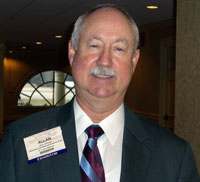 Top state officials will keynote the Iowa Renewable Fuels Association Summit on Wednesday in Des Moines.
Top state officials will keynote the Iowa Renewable Fuels Association Summit on Wednesday in Des Moines.
The event will feature the latest news in Iowa’s biodiesel and ethanol industries with a keynote address by Iowa Governor Chet Culver and a special address by Iowa Secretary of Agriculture Bill Northey.
Iowa is the leader in renewable fuels production with 26 ethanol refineries and the capacity to produce over 1.7 billion gallons annually. There are another 21 ethanol refineries under construction or expansion that will add 1.6 billion gallons of annual capacity. In addition, Iowa has 14 biodiesel refineries with a combined annual capacity of over 315 million gallons either in operation or under construction.
The Iowa Renewable Fuels Association was formed in 2002 to represent the state’s ethanol and biodiesel producers.



 In what might seem like a bit of an ironic twist, oil giant Chevron is getting into the biodiesel business. The California-based company has a 22% share of a 20-million-gallon-a-year biodiesel refinery set to open next month in oil-central Galveston. The
In what might seem like a bit of an ironic twist, oil giant Chevron is getting into the biodiesel business. The California-based company has a 22% share of a 20-million-gallon-a-year biodiesel refinery set to open next month in oil-central Galveston. The  The Federal Reserve Bank of Chicago’s latest
The Federal Reserve Bank of Chicago’s latest  A day after getting a close-up look at a 100 percent ethanol-powered IndyCar, President Bush checked out the battery-powered options on the White House South Lawn, calling on Congress to fully fund his budget request for alternative sources of energy.
A day after getting a close-up look at a 100 percent ethanol-powered IndyCar, President Bush checked out the battery-powered options on the White House South Lawn, calling on Congress to fully fund his budget request for alternative sources of energy.  A University of Florida microbiology professor was among a small group of alternative energy experts who met with President Bush Friday at the White House.
A University of Florida microbiology professor was among a small group of alternative energy experts who met with President Bush Friday at the White House.  According to an
According to an 
 The
The  USDA’s Rural Development department has been involved in assisting rural communities in a number of project areas over the years. One of them is the area of renewable energy and energy efficiency.
USDA’s Rural Development department has been involved in assisting rural communities in a number of project areas over the years. One of them is the area of renewable energy and energy efficiency. 